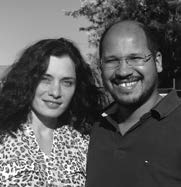A family of five came nearly every day to the Seventh-day Adventist compound in South Sudan’s capital, Juba, to ask for food.
Peter Fenoy, a missionary physician running the small Munuki Seventh-day Adventist Clinic on the compound, found the family’s actions puzzling.
“What is going on with these people?” he asked himself. “Why are they coming every day for food? Can’t they do anything for themselves?”
One day, Peter decided to look for answers, and he went to the family’s nearby home. What he saw shocked him. The father, mother, two daughters, and son were taking turns eating. The father and son would eat one day, and the mother and daughters would eat the next day.
Peter, a native of Argentina, returned to the compound and shared his discovery with his wife, Natasha, who was born in South Ossetia, part of the former Soviet Union.
“We are focusing only on what we are doing - medical work - and forgetting the people around us who need something else”, he told her. “Medical work is a good thing, but the community needs something else: clean water, food, mosquito nets, and containers for carrying water”.
After praying, Peter decided to write a U.S. 150,000 proposal to the Adventist Development and Relief Agency’s world headquarters in the United States. He had never written a project proposal before, but ADRA embraced it and covered its budget. In a short time, the Munuki Seventh-day Adventist Clinic became known as the ADRA Juba Project. It was 2005, months before a peace agreement ended a festering armed conflict.
The small clinic expanded its services to offer food and nonfood items, water sanitation, and emergency assistance. In a single year, the project’s funding skyrocketed from 150,000 to 2 million.
“I was surprised”, Peter said. “I realized that focusing on people and looking to meet their needs can develop projects that help others”.
Peter’s life changed drastically. ADRA sent him to Andrews University in the U.S. state of Michigan to earn a master’s degree in international development. Then he worked for a number of aid agencies, including ADRA, the Danish Refugee Council, World Vision, and UNICEF, in Jordan, Lebanon, Bolivia, South Ossetia, and Russia’s republic of Chechnya.
But everything started with one small thing - a desire to understand why a family was asking for food every day.
“My whole life focused on heath before that. I didn’t realize that there was something beyond the consulting room”, Peter, 39, said in an interview at River Plate Adventist University, his alma mater that sends missionaries like him around the world.
“Don’t just focus on what you have and what you are supposed to do”, said Peter, left. “Seek to understand what people really need - and then you can offer a better and more Christ-like response”.

